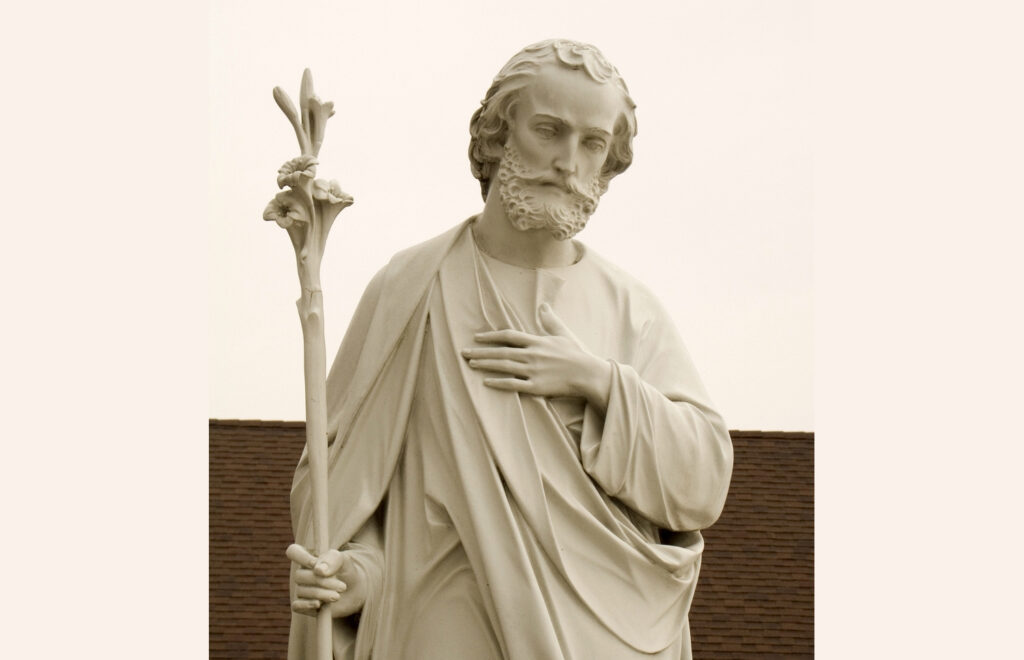This year, the Solemnity of St. Joseph, which the Church celebrates annually on March 19, has a special significance. On Dec. 8, 2020, Pope Francis ushered in the Year of St. Joseph, which will end Dec. 8, 2021. The proclamation was done in conjunction with the 150th anniversary of Pope Pius IX’s declaration of St. Joseph as Patron of the Universal Church.
As noted by Pope Francis, turning to St. Joseph is especially meaningful during these times, not only because cultural norms are eroding the sanctity of marriage and the family, but because of the pandemic. As patron of a happy death, we take comfort in St. Joseph, who is believed to have died in the company of Jesus and Mary.
With so many COVID victims deprived of the comfort of family and friends during their final hours on earth, we as Church can pray to St. Joseph and ask him to accompany and comfort the dying through their final days of loneliness.
Pope Francis also noted that the pandemic has helped us see more clearly the importance of ordinary people who, though far from the limelight, exercise patience and offer hope to the sick and dying. The Holy Father explained that the many health care workers whose human touch is truly the touch of grace resemble “Saint Joseph, the man who went unnoticed, a daily, discreet and hidden presence, who nonetheless played an incomparable role in the history of salvation” (“Patris Corde”).
St. Joseph was chosen by God for the privilege of being the husband of Mary and guardian of the child Jesus, yet he remained humble and hidden, sanctified in obscurity and silence. The fact that none of St. Joseph’s words are recorded in Scripture is a testimony to silence as a powerful witness of God’s loving presence.
We know from Scripture that Joseph was a just man whose obedience to God was unconditional. Therefore, we pray to him with confidence and great joy. As an ordinary carpenter, his sanctity was visible not because of what he accomplished, but in the way he lived his life as a faith-filled man of God.
Ordinary workers can look to Joseph as a model laborer who understood that all work is holy when embraced with careful attention for the honor and glory of God. It’s unlikely that customers or neighbors of in this humble carpenter recognized his privileged position in the plan of redemption. Yet surely his dedication to Mary as husband and his loving presence as the father of Jesus could not have gone unnoticed.
Joseph of Nazareth was the kind of saint that Pope Francis referred to in “Gaudate et Exsultate,” as “the saints next door.” In that apostolic exhortation, Francis called ordinary people “the middleclass of holiness,” and wrote that he likes to contemplate “those parents who raise their children with immense love, men and women who work hard to support their families, and the sick and elderly religious who never lose their smile.”
In recent times, St. Joseph is often associated with real estate kits that claim burying a statue of the saint will result in a quick house sale. Such practices border on superstition. We must remember that it’s the prayer of intercession to the saint who intercedes before God on our behalf that may result in the sale of the house, not the buried statue.
This year as we commemorate the feast of the foster father of Jesus, we honor him with the kind of devotion he so richly deserves. As Father Stanley Smolenski, diocesan director at the Shrine of Our Lady of Joyful Hope in South Carolina, noted, “This third millennium has been providentially reserved for St. Joseph. The first was Christocentric via the Councils, the second was Marian-focused on her devotions, apparitions and dogmas. That means that the third person of the Earthly Trinity, St. Joseph, would naturally follow.”
His reference to the Holy Family as the “Earthly Trinity” invites food for thought. While the Trinitarian nature of God is beyond human understanding, the Holy Family remains a human reflection of the perfect love that exists within the communion of the Most Blessed Trinity.
Only the Holy Family bears the name “holy,” serving as a model not only for families, but for every person who strives to live out the call to holiness within the context of their vocation in life.
Information regarding how to attain indulgences during the Year of St. Joseph is available here.

